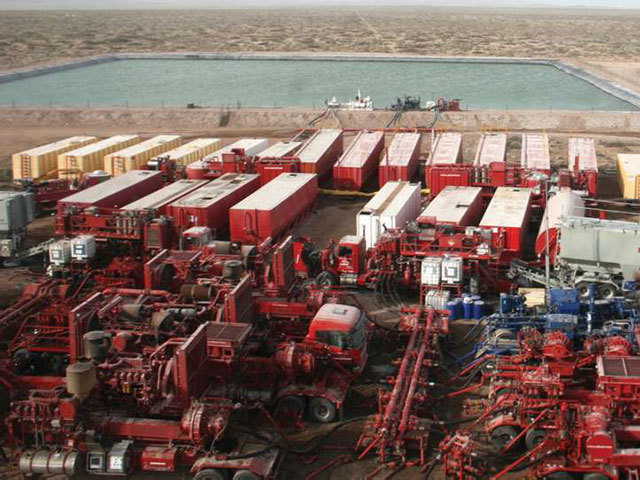
US shale drillers will soon be able to sell their oil all over the world. Too bad no one needs it right now.
A congressional deal to lift the 1970s-era prohibition on shipping crude overseas has the potential to unleash a flood of oil from Texas and North Dakota shale fields into markets already flush with cheap supplies from the Persian Gulf, Russia and Africa.
The arrival of US barrels in trading hubs from Rotterdam to Singapore will intensify competition for market share between oil-rich nations, publicly traded producers and trading houses, adding pressure to prices that have tumbled 67 percent in the past 18 months. In the longer term, it may also extend a lifeline to shale drillers strapped for cash after amassing huge debt loads during the boom years.
“The winners in all of this are the US oil producers who now have a bigger market for their shale” output, said Gianna Bern, founder of Brookshire Advisory and Research Inc. in Chicago and a former BP Plc oil trader. “Unfortunately, it’s coming at a time when there’s already way too much crude on the global market.”
U.S. oil explorers from Exxon Mobil Corp. to Continental Resources Inc. have been agitating for an end to the export ban for most of this decade as technological advances in drilling and fracking opened up vast, untapped reserves of crude. The so- called shale revolution has lifted US oil output for seven straight years, making the nation the world’s third-biggest producer behind Russia and Saudi Arabia.
Outside of shipments to Canada, oil pumped from U.S. fields stayed in the country, helping boost supply to the highest for this time of year since 1930. As the glut swelled, US crude sank to more than $27 a barrel below overseas prices. Now the glut has spread across the world, and West Texas Intermediate oil is less than $1 below international benchmark Brent.
“We have to have an outlet for our crude,” ConocoPhillips Chief Executive Officer Ryan Lance said during an event hosted by the Council on Foreign Relations in New York. US oil has fetched a lower price than international crude because it’s been “trapped” by the export ban, he said.
Oil producers, rig owners, drill-bit manufacturers and oilfield service providers around the world have been canceling exploration projects, reducing budgets and firing hundreds of thousands of workers to cope with the worst price slump in a generation.
Moody’s Investors Service said on Wednesday that it expects the industry to continue limping at least through 2017 as weak cash flows discourage drilling and the declining values for oil and gas fields make asset sales less effective tools to generate cash.
Although the end of the export ban may eventually hurt US refiners who have almost exclusive access to shale crude, the narrower discount means there’s little difference between buying domestic and foreign oil.
Refiners in the US, which have gained 18 percent this year compared with a 51 percent slump for producers, also benefit from lower costs than their overseas competitors, helped by the cheapest natural gas in 20 years.
“They’re positioned to succeed regardless,” said Carl Larry, head of oil and gas for Frost & Sullivan LP. “They can still make products cheaper than anywhere in the world. It’s the largest refining system in the world. Regardless of whether the US exports crude, they’ll be ahead of the game.”
Lifting the ban may also trigger a hiring frenzy for traders and shipping schedulers in Houston, as US oil producers that never before had a presence in overseas markets build trading desks, said Christopher Geier, an energy investment banker at Sikich Investment Banking in Chicago.
The prospect of unfettered exports offers is a boon commodity trading houses such as Vitol Group and Mercuria Energy Group Ltd, which have built up their oil trading desks and invested in ports, pipelines and export facilities even as a slump in commodities prices to the lowest in 16 years hurts other parts of their businesses.
“It provides a bunch of new trading opportunities and it is also a market with lots of access to capital” Olivier Jakob, managing director of industry consultant Petromatrix GmbH in Zug, Switzerland, said in an interview on Wednesday. “For the traders, it is a very significant new development and opportunity.”
Recommended for you
